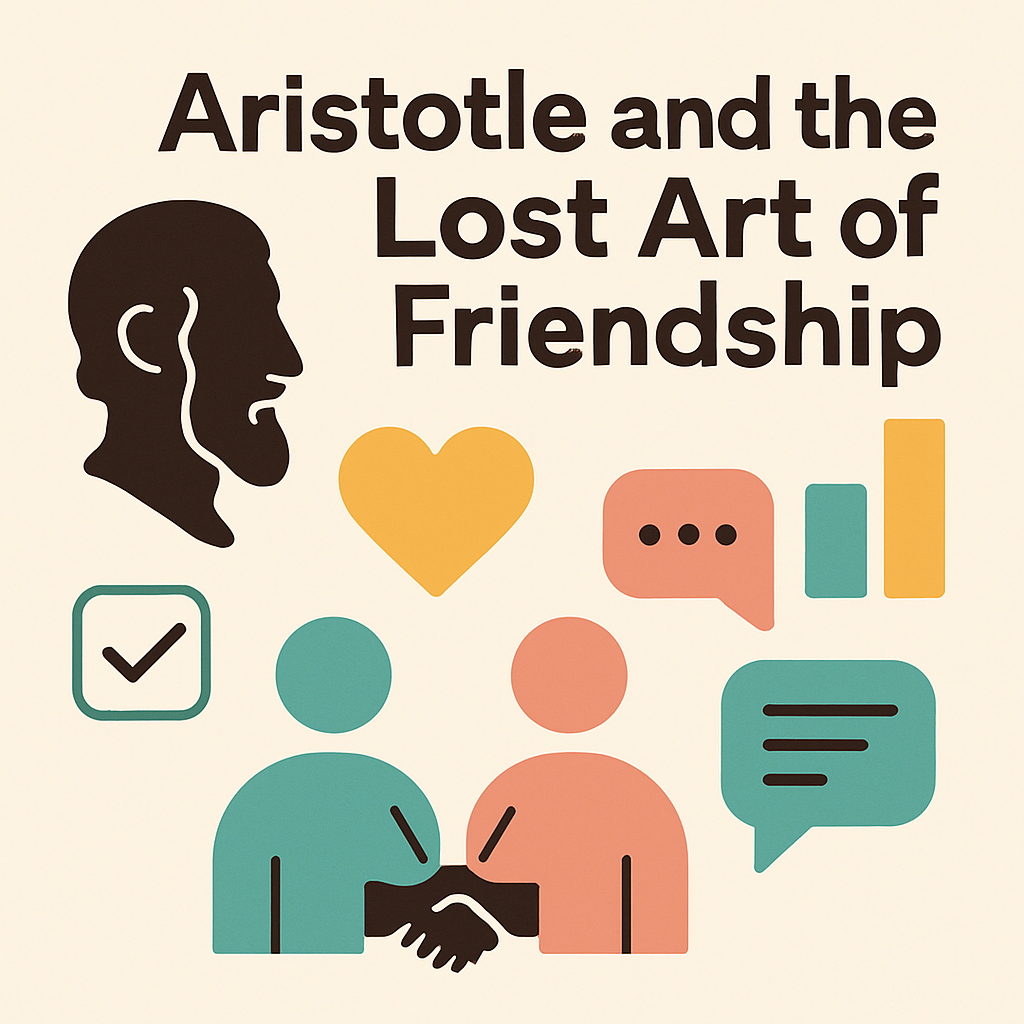
ChatGPT:
Why Brains Need Friends — and Aristotle Already Knew It
From virtue to neurons: how ancient philosophy meets modern neuroscience in the age of loneliness
If Aristotle had access to an fMRI machine, he would feel vindicated. More than two thousand years ago, he called humans zoon politikon—social animals whose happiness depends on living well with others. Today, neuroscientist Dr. Ben Rein, in his new book Why Brains Need Friends: The Neuroscience of Social Connection, provides biological proof of what the philosopher could only intuit.
Rein’s argument is simple but urgent: friendship isn’t a luxury; it’s a biological necessity. Our brains evolved for connection, and when that connection disappears, the mind and body begin to break down. Aristotle said friendship was the foundation of the good life. Rein shows it’s also the foundation of good mental health.
The Virtue of Connection
Aristotle believed there were three kinds of friendship: those of utility, pleasure, and virtue. The first two are transactional—rooted in usefulness or enjoyment. The third, virtue friendship, is built on mutual goodness. These friendships endure because both people admire and nurture each other’s character.
Rein’s neuroscience tells the same story in biological terms. Human brains are wired to thrive on empathy, trust, and cooperation. Mirror neurons allow us to share emotions. Oxytocin, the bonding hormone, lowers anxiety and deepens trust. When we connect meaningfully, dopamine and serotonin activate the brain’s reward circuits, creating feelings of stability and joy.
Aristotle’s “moral virtue” and Rein’s “neural health” turn out to be two sides of the same truth: to flourish, humans must connect.
Loneliness Hurts Like Pain
Rein’s most striking claim is that isolation doesn’t just make us sad—it physically hurts. Neuroscience shows that loneliness activates the same brain regions that process physical pain. Chronic disconnection floods the body with cortisol, the stress hormone, which damages memory and immunity and even shortens lifespan.
Aristotle warned that a person without friends becomes “either a beast or a god”—cut off from the shared life that makes us human. Rein updates the warning: people without meaningful relationships experience cognitive decline, inflammation, and higher mortality. Loneliness isn’t just a social issue—it’s a public health emergency.
The Digital Dilemma
Rein calls social media “the illusion of connection.” It gives the brain a quick dopamine fix but none of the deeper neurochemical benefits of real presence—no oxytocin from touch, no empathy from tone or expression. He describes this as “social malnutrition.”
Aristotle, who knew nothing of screens but much about human nature, might call this the triumph of lower friendships. Digital exchanges are convenient and pleasurable but rarely virtuous—they don’t refine our character or cultivate empathy. Both thinkers would agree: virtual contact can’t replace the moral and biological nourishment of shared life.
Friendship as Medicine
Rein’s research reveals that strong relationships literally heal the body. Friendship reduces inflammation, lowers blood pressure, and protects the brain from stress-related damage. People with close social ties recover from illness faster and live longer, regardless of income or diet.
Aristotle would have called this eudaimonia—human flourishing achieved through virtue and friendship. His “moral medicine” finds its modern parallel in Rein’s “neural medicine.” The mind and the brain, it turns out, are cured in the same way: by companionship, empathy, and love.
Rewiring for Empathy
Rein’s most hopeful finding is that empathy isn’t fixed—it’s trainable. Through gratitude, listening, volunteering, and authentic socializing, we can rebuild the brain’s empathy circuits. This neuroplasticity echoes Aristotle’s concept of habitual virtue: moral excellence isn’t innate but formed through repetition.
Practice kindness, and kindness becomes your nature. Rein gives that process a biological twist—practice connection, and your brain rewires itself for belonging. In both frameworks, the act of doing good changes not just your behavior but your biology.
When Individualism Makes Us Sick
Rein’s data also show that loneliness thrives in wealthy, individualistic societies. The more we prize independence, the more disconnected we become. Aristotle saw this danger long ago: humans, he argued, find meaning only in community. A society that neglects shared purpose and empathy may achieve comfort but not happiness.
Both Rein and Aristotle warn that isolation, whether moral or neurological, is unsustainable. We cannot flourish as solitary atoms. The self is social to its core.
Ancient Wisdom, Modern Science
In the end, Why Brains Need Friends doesn’t just complement Aristotle—it confirms him. The philosopher said virtue friendship perfects the soul; Rein shows it also regulates the brain. Both insist that belonging isn’t sentimental—it’s essential.
Rein’s neuroscience adds new urgency to Aristotle’s moral insight: if you want to live well, you need friends who ground you in empathy, honesty, and care. The reward is not only ethical harmony but biological health.
In a world crowded with noise but starved of meaning, the lesson feels timeless and newly relevant:
Aristotle was right all along.
We don’t just want friends — our brains need them.
